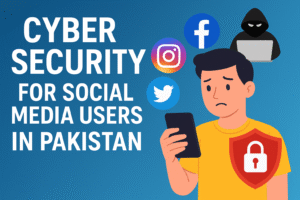⚠️ Cyber Security for Social Media Users in Pakistan – Urgent Advisory for Immediate Action

In recent days, Pakistan has experienced an alarming rise in cybersecurity threats, making Cyber Security for Social Media Users in Pakistan more critical than ever. With increasing sophistication of cyberattacks, it is crucial for internet users, particularly those using social media platforms, to take immediate and proactive steps to safeguard their personal data. Government employees, officials working in sensitive institutions, and the general public are all being advised to be extra cautious to prevent falling victim to these cyberattacks. Cyber Security for Social Media Users in Pakistan This advisory serves as a comprehensive guide to help protect your digital identity and prevent unauthorized access to your online accounts.
With Cyber Security for Social Media Users in Pakistan the growing complexity of cybercrime, it’s important to stay ahead of potential threats. In response to this surge in cyberattacks, Pakistani authorities are strongly encouraging all social media users to adopt stricter security protocols. This advisory outlines the critical measures that need to be implemented immediately to ensure your safety.
🔐 Update Your Passwords Without Delay
The first and most important step in Cyber Security for Social Media Users in Pakistan is to change the passwords of all your online accounts, especially those linked to social media platforms. Passwords are the first line of defense against cyber threats, yet many users fail to update them regularly or use weak passwords that are easily compromised.
Why Passwords Matter:
Your password is the key to your digital world. It is your first defense against hackers trying to gain unauthorized access to your social media profiles, banking apps, emails, and other personal information. Cybercriminals use various methods, such as phishing attacks, password cracking tools, and data breaches, to steal login credentials. Without strong passwords, you make it easier for them to compromise your accounts.
Tips for Creating a Strong Password:
-
Length matters: Aim for passwords that are at least 12 characters long. The longer the password, the harder it is to crack.
-
Use a mix of characters: Incorporate a combination of uppercase and lowercase letters, numbers, and special characters (e.g., @, #, $, %, etc.).
-
Avoid common words: Refrain from using simple and predictable words like your name, birthdate, or common phrases.
-
Use a passphrase: A passphrase made up of random words or a sentence is an excellent alternative to a standard password. For example, “RedTiger23!CleverMoon”.
-
Use different passwords for each account: Reusing the same password across multiple accounts makes it easier for hackers to breach all your profiles if one account is compromised.
If you have trouble remembering multiple complex passwords, consider using a password manager to store them securely.
🛡️ Ensure Your Antivirus and Security Software Is Up-to-Date
Your device security tools are essential for protecting you from malicious software (malware), viruses, and cyberattacks. Many individuals neglect to update their antivirus software, leaving their devices vulnerable to exploitation.
Outdated antivirus software may fail to recognize and protect against new types of malware. Cybercriminals are constantly evolving their techniques, and keeping your security software updated ensures that your device is protected from the latest threats.
Why Antivirus Software Is Critical:
Antivirus software helps detect, block, and remove malicious software that may be attempting to gain unauthorized access to your system. It provides real-time protection, monitors suspicious activity, and blocks harmful files from being downloaded or executed on your device.
Regular Updates and Patches:
Ensure that your antivirus software, operating system, and any security tools you use are configured to update automatically. Always install the latest patches released by your software provider to address known vulnerabilities and weaknesses in your system.
👁️ Monitor Your Accounts for Suspicious Login Activities
Cybercriminals frequently attempt to access accounts by exploiting weak or leaked credentials. They may also attempt to log in from unfamiliar locations or devices, indicating a potential breach of your account’s security.
What to Look for:
Regularly check your account’s login activity for any unusual activity, such as access from unknown devices or geographic locations. Most social media platforms, including Facebook, Instagram, and WhatsApp, allow you to view a log of where your account has been accessed.
What to Do if You Notice Suspicious Activity:
If you detect suspicious login attempts, immediately change your password, log out of all devices, and enable Two-Factor Authentication (2FA) for an added layer of protection. Most platforms provide an option to log out remotely from any device.
Key Indicators of Suspicious Activity:
-
Logins from unfamiliar locations or countries
-
Multiple failed login attempts
-
New devices or browsers accessing your account
-
Notifications from platforms regarding changes to your account (e.g., password changes, email address modifications, etc.)
🏢 Government and Sensitive Institutions Are Also at Risk
While the advisory primarily addresses individual users, it also emphasizes that Cyber Security for Social Media Users in Pakistan includes institutions handling sensitive data. Government agencies, law enforcement bodies, and critical infrastructure offices are prime targets for cybercriminals seeking to steal confidential data or disrupt operations.
Cyberattacks on Institutions:
Cyberattacks against government agencies can result in the loss of sensitive data, espionage, and national security risks. As a result, government bodies and sensitive departments are urged to perform regular security audits, update their cybersecurity infrastructure, and back up critical data in secure, encrypted locations.
Preventative Measures for Institutions:
-
Conduct regular cybersecurity audits and vulnerability assessments.
-
Ensure that all data is encrypted and backed up regularly.
-
Educate employees about phishing scams and social engineering tactics.
-
Implement robust firewalls and anti-malware systems.
✅ Key Security Measures for All Users:
Here is a list of essential security actions that all users, including individuals and employees of sensitive institutions, should immediately take to protect their accounts and data:
-
Change passwords for all online accounts immediately: Make this a priority to prevent unauthorized access.
-
Enable Two-Factor Authentication (2FA): Adding an extra layer of security with 2FA is highly recommended. This requires a second form of verification, such as a code sent to your phone, in addition to your password.
-
Avoid clicking on suspicious links or emails: Phishing emails and links disguised as legitimate sources are commonly used to gather personal information. Always verify the sender before clicking on any link or opening an attachment.
-
Keep antivirus and firewall software up to date: Regularly update these tools to protect your devices from malware.
-
Be cautious when using public Wi-Fi: Public Wi-Fi networks are not secure and may allow hackers to intercept your data. Avoid logging into important accounts or performing financial transactions when connected to public networks.
-
Regularly check login activity: Stay alert and monitor login history on platforms like Facebook, Instagram, WhatsApp, and others to detect unauthorized access.
🔚 Conclusion:
Cybersecurity threats are evolving rapidly, and every internet user is a potential target. From social media users to government officials, no one is immune to the risks posed by hackers and cybercriminals. To protect your digital identity and personal data, it is crucial to adopt strong cybersecurity practices and stay vigilant.
In an age where our lives are increasingly online, securing your digital identity has never been more important. By following the steps outlined in this advisory on Cyber Security for Social Media Users in Pakistan, you can significantly reduce the risk of falling victim to cyberattacks and protect your sensitive information from malicious actors.
Remember: A secure account is not just a precaution but a necessity in today’s digital world. Stay safe, stay alert, and help spread awareness of these vital security measures to others.

